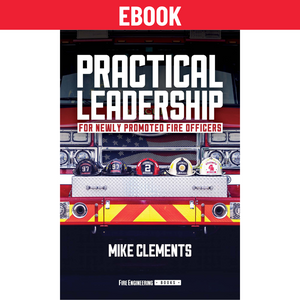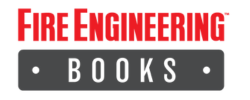
Practical Leadership for Newly Promoted Fire Officers
Mike ClementsPractical Leadership for Newly Promoted Fire Officers
By: Mike Clements
You’ve earned the promotion—now what?
Stepping into an officer role is one of the most exciting—and challenging—transitions in the fire service. In Practical Leadership for Newly Promoted Fire Officers, veteran fire officer Mike Clements delivers a clear leadership guide designed to help new officers lead effectively from day one.
Drawing from real-world frontline experience, Clements offers practical strategies and leadership frameworks focused on self-awareness, communication, conflict resolution, and team development. This book goes beyond management theory to address the day-to-day realities of leading in high-stress, high-accountability environments.
Whether you're navigating station dynamics, handling pushback to change, or building a high-performing crew, this resource provides the tools to help you lead with confidence and integrity.
Key topics include:
- Insights into managing the Toxic Triad: Fear-Ego-Pride
- Strategies for managing stress in a high-stress environment
- How to navigate pushback to organizational changes
- The dos and don’ts of mentoring and developing employees
- The keys to conflict resolution: how to have difficult conversations
- How to get things done (and the nine internal factors getting in the way of execution)
- Best practices for communicating effectively
- Tips and tactics for managing drama in the fire station
From establishing crew trust to creating a positive culture and getting things done, Clements provides practical, actionable guidance that new officers can apply immediately.
Leadership isn’t about the badge. It’s about how you show up, set the tone, and serve your people. Start strong. Lead well. Make a difference.
*****
Table of Contents
Introduction
1. The Value of Self-Awareness in Leaders
- Characteristics of Self-Aware Leaders
- Reflective Questions
2. Inviting Feedback, Giving Feedback, and Creating
- A Culture of Coachability
- Why Feedback Is Essential
- Building a Feedback-Friendly Workplace Begins with You
- Receiving Feedback as a Leader
- Practice Receiving and Acting on Challenging Feedback
- Giving Feedback to Others
- Set the Stage for a Positive Interaction
- Be Purposeful When Delivering Negative Feedback
- Balance Negative Feedback with Positive
- Make It Personal
- Reflective Questions
3. Managing Ego
- The Fear–Ego–Pride Triad
- When Ego Gets in the Way, and Why Humility Is the Antidote
- Do You Struggle with Humility? A Diagnostic Checklist
- Best Practices for Developing Humility
- Conclusion
- Reflective Questions
4. Active Listening
- Active Listening Is the Cornerstone of Good Communication
- What Impedes Active Listening?
- Practice and Improve Your Active Listening Skills
- After Listening, Respond Thoughtfully
- Create a Culture of Listening
- Conclusion
- Reflective Questions
- Notes
5. Empathetic Leadership and Relationship Building
- What Is Empathetic Leadership?
- Why Is Empathetic Leadership Important?
- Nine Common Pitfalls to Avoid
- How Can You Lead Empathetically?
- Filling Emotional Bank Accounts
- Supporting Mental Health
- Self-Improvement for Leaders
- Supporting the Overall Crew
- Reflective Questions
- Notes
6. Developing Other Employees
- Training Your Employees in an Ever-Changing World: Basic Principles
- Challenge Your Employees and Then Give Them a Chance to Fly
- The Value of Mentoring
- Tips for Being a Great Mentor
- The Dos and Don’ts of Being a Great Mentee
- Seize the Benefits of Reverse Mentoring
- Reflective Questions
- Note
7. Learn What the What Is for Employees
- Why the What Matters
- How Can Leaders Identify Their Employees’ Whats?
- How Can Leaders Leverage Their Employees’ Whats?
- Reflective Questions
- Notes
8. Help Your New Employees Succeed
- How to Retain New Employees
- Give New Hires the Keys to Success
- Reflective Questions
9. Reward and Recognize Employees
- Reasons to Reward and Recognize Employees
- Six Common Mistakes Leaders Make When Rewarding and Recognizing Workers
- Eleven Ways to Hardwire Frequent Rewards and Recognitions
- into Your Culture
- Making It Count: How to Ensure Your Rewards
- and Recognition Are Effective
- Reflective Questions
- Notes
10. Creating a Culture of Ownership, and How Positivity
- Plays a Crucial Role
- Characteristics of Employees Who Take Ownership
- What Is the Relationship Between Positivity and Ownership?
- Hindrances to Creating a Culture of Positivity and Ownership
- Thirteen Ways to Create and Sustain a Positive Workplace Culture
- How to Encourage Your Crew to Take Ownership
- Reflective Questions
- Notes
11. Culture Busters: We/They, Generalizations, and Gossip
- Culture Buster #1: Disregard for the Rules
- Culture Buster #2: Generalizations
- Culture Buster #3: We/Theyism
- Culture Buster #4: Gossip
- Culture Buster #5: Carrying Messages
- Culture Buster #6: Bullying and Hazing
- Reflective Questions
- Notes
12. Change Management
- Why Leaders Need Change Management Skills
- Making Continuous Improvement a Part of Your Crew’s Culture
- The Pitfalls of Positive Change: Seven Mistakes to Avoid
- Managing Pushback to Change Initiatives
- Reflective Questions
- Notes
13. Execution: How to Get Things Done
- Nine Internal Factors That Get in the Way of Execution
- Eighteen Good Habits for Getting Things Done
- Reflective Questions
- Note
14. Clarity Counts: Give Clear Directions
- Why Is Clear Communication So Important?
- Define What Good Behavior Looks Like
- Are You Leading with Clarity or Confusing Your Crew?
- Reflective Questions
15. Setting and Communicating Bold and Clear Goals
- What Is a Bold Goal?
- Four Benefits of Setting Bold Goals
- What Is the Problem with Setting Low, Achievable Goals?
- Ten Tips for Setting and Achieving Goals
- Reflective Questions
- Note
16. How to Run a Meeting
- Why Meetings Are Important
- What Is the Ideal Size for a Meeting Group?
- Four Benefits of Smaller Meeting Groups
- Eight Hallmarks of an Unproductive Meeting
- How Frontline Leaders Can Get the Most Out of Meetings
- What About One-On-One Meetings?
- Reflective Questions
- Notes
17. Time and Priority Management and Delegation
- The Benefits of Time Management Skills
- Do You Need Better Time Management Skills?
- How to Master Time and Priority Management
- How to Brush Up on Your Delegation Skills, and Why You Should
- Reflective Questions
- Note
18. Communication
- What Are the Hallmarks of Effective Communication?
- Why Is Great Communication Important?
- Communication Don’ts
- Best Practices for Communicating Effectively
- When It Is Vital to Communicate with Your Crew
- Turning It Around: How Can Leaders Help Their Crews
- Communicate Effectively?
- Conclusion
- Reflective Questions
- Note
19. Conflict Resolution: How to Have Difficult Conversations
- How to Build Up Your Conflict Management Skills
- How to Have Difficult but Necessary Conversations
- While Preserving Relationships
- Reflective Questions
- Note
20. Managing Drama
- Basics of Workplace Drama
- Factors Creating or Contributing to Drama
- Tips for Managing Drama in the Organization
- How to Respond When You Get Upset at Work
- Reflective Questions
21. Managing During Stressful Times
- Why It’s So Important to Manage Stress
- Five Stress Management Mistakes to Avoid Making
- Managing Your Own Stress: What You Need to Know
- How to Manage Your Team During Stressful Times
- Reflective Questions
- Note
Index
- Format:
- Paperback
- Number of Pages:
- 262
- Published Date:
- July 2025
- ISBN:
- 9781593705190
Reviews
-
Quality concepts
Wisdom, experience, and a passion for the fire service—these are three invaluable qualities walking out the door every time a firefighter retires. Across the country, departments are losing seasoned leadership faster than we can develop it. This book offers a practical, no-nonsense approach to the essential leadership principles that must be present in every firehouse. It's a roadmap for capturing what’s being lost—and cultivating it in the next generation.
-
Applicable for all agencies
The author has provided a relatable approach for all front line supervisors. I appreciate the correlation between theory and application. I will be including this in our professional development process.
-
Practical Leadership for Newly Promoted Fire Officers
Chief Clements is a wealth of knowledge and leader within the fire service. His commitment to leadership and providing the foundational knowledge to be successful as a company officer is a testament to his dedication in making the fire service better today, than yesterday. He is a leader, author, and a true friend. I highly recommend this great read!






